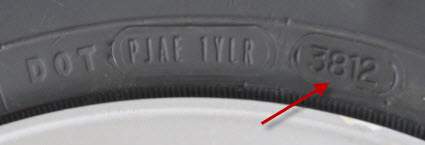How Do I Tell How Old My Tires Are
Have you ever wondered just how old your tires are? No, I’m not talking about when you purchased them and had them installed. I mean when they were actually manufacturered. How can you find it out, and is it really all that important?
How To Find Your Tire’s Manufacture Date
The good news is that finding the date your tire was made is pretty straight forward. When looking at the sidewall you will see the letters “DOT” and a string of 10-12 numbers/letters that follow. This is a code that the U.S. Dept of Transportation requires on every tire offered for sale in the United States. It lets you know things like:
- Where the tire was made
- The week and the year it was made
- Misc. manufacturer code
For all tires that were made after the year 2000, the last four digits in this unique code are what you are looking for in determining the age of your tires. For example, in the photo below you can see the numbers “3812”. This means the tire was made in the 38th week of the year 2012.
The process of finding this information is a little different for tires made before 2000, but that is not that important as it is highly unlikely you would be driving on tires that old. Please tell me you aren’t driving on 15 year old tires. OK, let’s move on now and find out why this info so important?
What You Should Know About Tire Age
We won’t go into a chemistry lesson on tire tread compounds, but since the tread is composed of rubber compounds, fabrics and steel belts, its strength and durability degrade over time. Kind of like how we get as we grow older! Add in the effects of UV rays, chemicals used on roadways and the everyday road hazards and abuse a tire takes, and it is easy to see that they simply will not last forever.
For the most drivers, tire age will never be an issue. Those who drive their cars/trucks every day will likely go through a set of tires long before age will ever play a role. But for folks who drive RV’s a few times a year, or owners of antique/collector cars who only drive occasionally to various events during the year, then this will be a factor. Even those who have boat or utility trailers will often run into tire age issues.
Finally, spare tires sitting in the trunk for years or hiding underneath a pickup can develop structural integrity problems as well. That is if you can even find that spare tire hiding in the trunk under all the other stuff kept in there.
How Long Will Tires Last?
There is no set law on how old your tires can get. However, there are some guidelines that will provide some direction. For the most part tires provide their best performance during the first 6-7 years, regardless of how many miles they have racked up on them.
During years 6-10, replacement is generally always recommended, especially if they have been driven an average of 12,000 miles or more per year. Structural integrity begins to break down, punctures and flats begin happening and worse yet, cracks in the sidewall begin appearing due to UV rays and ozone. Inspecting your tires becomes critical in order to stay safe on the road.
Tires beyond 10 years of age should be replaced regardless of use, or lack of use. The rubber has reached the end of its lifespan and the tread is likely to give out, especially on the highway where a blowout can be expected. It’s simply not worth the risk to you, your family and others on the road to drive on tires that old.
If you find it’s time to replace your tires we invite you to look over our tire reviews and find the new set of tires that provide you with the best performance, comfort and safety on the road.
Click Here To Go To Tire Reviews

